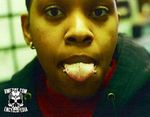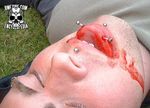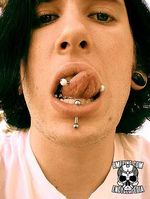Horizontal Tongue Piercing
A horizontal tongue piercing is exactly what it sounds like — a piercing done across the tongue (from ear to ear), rather than vertically.
Placement
It has be done both at the tip and deeper into the tongue, and multiple simultaneous placements have been shown to be possible. The placement that puts that impedes speech and eating less for the individual getting pierced should be used. The part of the tongue that bends with speech etc is NOT a suitable placement for this piercing.
The area decided upon to be pierced should then be checked for blood vessels with a flashlight. It is important to remember that not everyone's anatomy is suited for this piercing.
Procedure
The procedure is standard piercing with a needle and jewelry follow-through. The piercing takes longer to do, and can be quite painful. Some areas allow the use of spray anestheia for the procedure.
Healing and Aftercare
If proper jewelry is used in the proper placement for the individual, healing can take one to two months, and the swelling usually going down around the first two weeks. Healing time can be dramatically lengthened (sometimes over 5 months) with incorrect jewelry and placement.
Aftercare is similar to that of regular Tongue Piercing, and will require the relearning of such simple tasks such as easting and speaking. It is highly recommended that you take things "slow" during the healing process.
Long Term Health Issues
If a horizontal tongue piercing is not done properly it will cripple the piercee's ability to speak. This is not necessarily because of damage caused by the piercing, but because the placement of jewelry inside the tongue interferes with mobility.
In addition, there are serious Tooth-chipping risks due to the edgeward nature of the beads. Properly fitted jewelry (ie. the bead should sit flush with the tongue, with no bar showing) will minimize the chances of this, and flat or teflon/nylon beads may also be considered to minimize potential tooth damage.
Most piercers do not consider this a viable piercing because of the almost unavoidable side-effects.
Jewelry
Flexible jewelry such as Tygon will minimize this (nylon may not be flexible enough). Using extremely flexible jewelry will make healing much easier as well and is strongly urged.
To determine the best possible placement, observe the movement of the tongue during speech. In most people, there is a specific bend point — by avoiding a placement that will hinder this, speech damage can be minimized (but likely not eliminated).




